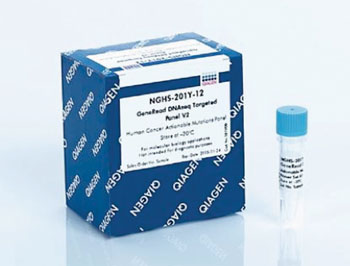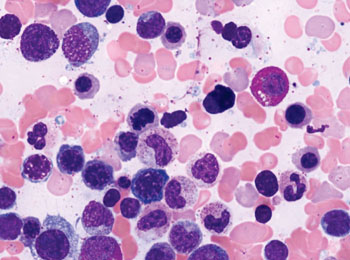Genomic Biomarkers Assess Treatment Prognosis in Blood Cancers
|
By LabMedica International staff writers Posted on 04 Aug 2014 |

Image: The GeneRead DNAseq Targeted Panels V2 kit (Photo courtesy of Qiagen).

B Image: Bone marrow aspirate smear from a patient with myelodysplastic syndromes (Photo courtesy of Dr. Robert P Hasserjian, MD).
The biomarker gene, splicing factor 3B subunit 1(SF3B1), is believed to play a critical role in the prognosis of patients with myelodysplastic syndromes (MDS), a group of hematological cancers in which bone marrow does not produce enough healthy blood cells.
Mutations of this gene, which is an important component of the spliceosome machinery, indicate a more favorable disease progression for patients than the "wild-type" gene, so testing for these gene variants could potentially provide important guidance for treatment based on a personalized healthcare approach to MDS.
QIAGEN N.V. (Hilden, Germany) announced it has acquired an exclusive global license to the biomarker SF3B1 from the University of Tokyo (Japan). QIAGEN licensed the SF3B1 biomarker in an ongoing expansion of the oncohematology offering for clinical research and diagnostics. Three additional spliceosome biomarkers implicated in various blood cancers and targeting variants in the U2 Small Nuclear RNA Auxiliary Factor 1 (U2AF1,U2AF35), the zinc finger (CCCH type), RNA-binding motif and serine/arginine rich 2 (ZRSR2) and the serine/arginine-rich splicing factor 2 (SFRS2) genes are also part of the license agreement.
Those genes are included in QIAGEN's GeneRead DNAseq Leukemia V2 gene panel for next-generation sequencing (NGS), which has been launched earlier this month together with 13 other new cancer gene panels that are compatible with any NGS sequencer and customizable to include other genes or gene regions of clinical or biological interest. The GeneRead technology provides the most cost-effective and time-efficient approach for target enrichment of assay panels for NGS. The panels use as little as 10 nanograms of starting DNA material per pool, require only three hours to enrich for targets and substantially reduce the time to go from isolated DNA sample to sequencing-ready libraries. They are compatible for use with formalin-fixed, paraffin-embedded (FFPE) samples, do not require specialized instruments, and achieve industry leading coverage of greater than 96% of coding regions, a specificity greater than 90% of reads on target and a greater than 90% uniformity of bases covered by at least 20% of the mean coverage depth.
Vincent Fert, MSc, QIAGEN's Personalized Healthcare Program Leader, said, “Building on a broad portfolio of molecular diagnostics for blood cancers, QIAGEN continues to partner with clinical researchers at pharmaceutical companies and academic centers to extend the benefits of personalized healthcare. Because several Pharma companies are developing potential anticancer drugs targeting the SF3B1 gene, this biomarker also holds potential for co-development as a companion diagnostic.”
Related Links:
QIAGEN N.V.
University of Tokyo
Mutations of this gene, which is an important component of the spliceosome machinery, indicate a more favorable disease progression for patients than the "wild-type" gene, so testing for these gene variants could potentially provide important guidance for treatment based on a personalized healthcare approach to MDS.
QIAGEN N.V. (Hilden, Germany) announced it has acquired an exclusive global license to the biomarker SF3B1 from the University of Tokyo (Japan). QIAGEN licensed the SF3B1 biomarker in an ongoing expansion of the oncohematology offering for clinical research and diagnostics. Three additional spliceosome biomarkers implicated in various blood cancers and targeting variants in the U2 Small Nuclear RNA Auxiliary Factor 1 (U2AF1,U2AF35), the zinc finger (CCCH type), RNA-binding motif and serine/arginine rich 2 (ZRSR2) and the serine/arginine-rich splicing factor 2 (SFRS2) genes are also part of the license agreement.
Those genes are included in QIAGEN's GeneRead DNAseq Leukemia V2 gene panel for next-generation sequencing (NGS), which has been launched earlier this month together with 13 other new cancer gene panels that are compatible with any NGS sequencer and customizable to include other genes or gene regions of clinical or biological interest. The GeneRead technology provides the most cost-effective and time-efficient approach for target enrichment of assay panels for NGS. The panels use as little as 10 nanograms of starting DNA material per pool, require only three hours to enrich for targets and substantially reduce the time to go from isolated DNA sample to sequencing-ready libraries. They are compatible for use with formalin-fixed, paraffin-embedded (FFPE) samples, do not require specialized instruments, and achieve industry leading coverage of greater than 96% of coding regions, a specificity greater than 90% of reads on target and a greater than 90% uniformity of bases covered by at least 20% of the mean coverage depth.
Vincent Fert, MSc, QIAGEN's Personalized Healthcare Program Leader, said, “Building on a broad portfolio of molecular diagnostics for blood cancers, QIAGEN continues to partner with clinical researchers at pharmaceutical companies and academic centers to extend the benefits of personalized healthcare. Because several Pharma companies are developing potential anticancer drugs targeting the SF3B1 gene, this biomarker also holds potential for co-development as a companion diagnostic.”
Related Links:
QIAGEN N.V.
University of Tokyo
Latest Molecular Diagnostics News
- Blood Proteins Could Warn of Cancer Seven Years before Diagnosis
- New DNA Origami Technique to Advance Disease Diagnosis
- Ultrasound-Aided Blood Testing Detects Cancer Biomarkers from Cells
- New Respiratory Syndromic Testing Panel Provides Fast and Accurate Results
- New Synthetic Biomarker Technology Differentiates Between Prior Zika and Dengue Infections
- Novel Biomarkers to Improve Diagnosis of Renal Cell Carcinoma Subtypes
- RNA-Powered Molecular Test to Help Combat Early-Age Onset Colorectal Cancer
- Advanced Blood Test to Spot Alzheimer's Before Progression to Dementia
- Multi-Omic Noninvasive Urine-Based DNA Test to Improve Bladder Cancer Detection
- First of Its Kind NGS Assay for Precise Detection of BCR::ABL1 Fusion Gene to Enable Personalized Leukemia Treatment
- Urine Test to Revolutionize Lyme Disease Testing
- Simple Blood Test Could Enable First Quantitative Assessments for Future Cerebrovascular Disease
- New Genetic Testing Procedure Combined With Ultrasound Detects High Cardiovascular Risk
- Blood Samples Enhance B-Cell Lymphoma Diagnostics and Prognosis
- Blood Test Predicts Knee Osteoarthritis Eight Years Before Signs Appears On X-Rays
- Blood Test Accurately Predicts Lung Cancer Risk and Reduces Need for Scans
Channels
Clinical Chemistry
view channel
3D Printed Point-Of-Care Mass Spectrometer Outperforms State-Of-The-Art Models
Mass spectrometry is a precise technique for identifying the chemical components of a sample and has significant potential for monitoring chronic illness health states, such as measuring hormone levels... Read more.jpg)
POC Biomedical Test Spins Water Droplet Using Sound Waves for Cancer Detection
Exosomes, tiny cellular bioparticles carrying a specific set of proteins, lipids, and genetic materials, play a crucial role in cell communication and hold promise for non-invasive diagnostics.... Read more
Highly Reliable Cell-Based Assay Enables Accurate Diagnosis of Endocrine Diseases
The conventional methods for measuring free cortisol, the body's stress hormone, from blood or saliva are quite demanding and require sample processing. The most common method, therefore, involves collecting... Read moreMolecular Diagnostics
view channelBlood Proteins Could Warn of Cancer Seven Years before Diagnosis
Two studies have identified proteins in the blood that could potentially alert individuals to the presence of cancer more than seven years before the disease is clinically diagnosed. Researchers found... Read moreUltrasound-Aided Blood Testing Detects Cancer Biomarkers from Cells
Ultrasound imaging serves as a noninvasive method to locate and monitor cancerous tumors effectively. However, crucial details about the cancer, such as the specific types of cells and genetic mutations... Read moreHematology
view channel
Next Generation Instrument Screens for Hemoglobin Disorders in Newborns
Hemoglobinopathies, the most widespread inherited conditions globally, affect about 7% of the population as carriers, with 2.7% of newborns being born with these conditions. The spectrum of clinical manifestations... Read more
First 4-in-1 Nucleic Acid Test for Arbovirus Screening to Reduce Risk of Transfusion-Transmitted Infections
Arboviruses represent an emerging global health threat, exacerbated by climate change and increased international travel that is facilitating their spread across new regions. Chikungunya, dengue, West... Read more
POC Finger-Prick Blood Test Determines Risk of Neutropenic Sepsis in Patients Undergoing Chemotherapy
Neutropenia, a decrease in neutrophils (a type of white blood cell crucial for fighting infections), is a frequent side effect of certain cancer treatments. This condition elevates the risk of infections,... Read more
First Affordable and Rapid Test for Beta Thalassemia Demonstrates 99% Diagnostic Accuracy
Hemoglobin disorders rank as some of the most prevalent monogenic diseases globally. Among various hemoglobin disorders, beta thalassemia, a hereditary blood disorder, affects about 1.5% of the world's... Read moreImmunology
view channel.jpg)
AI Predicts Tumor-Killing Cells with High Accuracy
Cellular immunotherapy involves extracting immune cells from a patient's tumor, potentially enhancing their cancer-fighting capabilities through engineering, and then expanding and reintroducing them into the body.... Read more
Diagnostic Blood Test for Cellular Rejection after Organ Transplant Could Replace Surgical Biopsies
Transplanted organs constantly face the risk of being rejected by the recipient's immune system which differentiates self from non-self using T cells and B cells. T cells are commonly associated with acute... Read more
AI Tool Precisely Matches Cancer Drugs to Patients Using Information from Each Tumor Cell
Current strategies for matching cancer patients with specific treatments often depend on bulk sequencing of tumor DNA and RNA, which provides an average profile from all cells within a tumor sample.... Read more
Genetic Testing Combined With Personalized Drug Screening On Tumor Samples to Revolutionize Cancer Treatment
Cancer treatment typically adheres to a standard of care—established, statistically validated regimens that are effective for the majority of patients. However, the disease’s inherent variability means... Read moreMicrobiology
view channel
Integrated Solution Ushers New Era of Automated Tuberculosis Testing
Tuberculosis (TB) is responsible for 1.3 million deaths every year, positioning it as one of the top killers globally due to a single infectious agent. In 2022, around 10.6 million people were diagnosed... Read more
Automated Sepsis Test System Enables Rapid Diagnosis for Patients with Severe Bloodstream Infections
Sepsis affects up to 50 million people globally each year, with bacteraemia, formerly known as blood poisoning, being a major cause. In the United States alone, approximately two million individuals are... Read moreEnhanced Rapid Syndromic Molecular Diagnostic Solution Detects Broad Range of Infectious Diseases
GenMark Diagnostics (Carlsbad, CA, USA), a member of the Roche Group (Basel, Switzerland), has rebranded its ePlex® system as the cobas eplex system. This rebranding under the globally renowned cobas name... Read more
Clinical Decision Support Software a Game-Changer in Antimicrobial Resistance Battle
Antimicrobial resistance (AMR) is a serious global public health concern that claims millions of lives every year. It primarily results from the inappropriate and excessive use of antibiotics, which reduces... Read morePathology
view channel
AI Integrated With Optical Imaging Technology Enables Rapid Intraoperative Diagnosis
Rapid and accurate intraoperative diagnosis is essential for tumor surgery as it guides surgical decisions with precision. Traditional intraoperative assessments, such as frozen sections based on H&E... Read more
HPV Self-Collection Solution Improves Access to Cervical Cancer Testing
Annually, over 604,000 women across the world are diagnosed with cervical cancer, and about 342,000 die from this disease, which is preventable and primarily caused by the Human Papillomavirus (HPV).... Read moreHyperspectral Dark-Field Microscopy Enables Rapid and Accurate Identification of Cancerous Tissues
Breast cancer remains a major cause of cancer-related mortality among women. Breast-conserving surgery (BCS), also known as lumpectomy, is the removal of the cancerous lump and a small margin of surrounding tissue.... Read moreTechnology
view channel
New Diagnostic System Achieves PCR Testing Accuracy
While PCR tests are the gold standard of accuracy for virology testing, they come with limitations such as complexity, the need for skilled lab operators, and longer result times. They also require complex... Read more
DNA Biosensor Enables Early Diagnosis of Cervical Cancer
Molybdenum disulfide (MoS2), recognized for its potential to form two-dimensional nanosheets like graphene, is a material that's increasingly catching the eye of the scientific community.... Read more
Self-Heating Microfluidic Devices Can Detect Diseases in Tiny Blood or Fluid Samples
Microfluidics, which are miniature devices that control the flow of liquids and facilitate chemical reactions, play a key role in disease detection from small samples of blood or other fluids.... Read more












_1.jpg)
.jpg)
